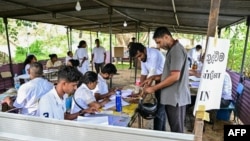From workers in sprawling tea plantations in the north to big cities in the south, millions of Sri Lankans cast ballots Saturday for a new president, who faces the daunting task of rebuilding an economy still coping with the aftershocks of its collapse two years ago.
It was the first election held since mass protests in 2022 ousted former President Gotabaya Rajapaksa, blamed for the country’s economic crisis.
President Ranil Wickremesinghe is among the three leading contenders and has promised to strengthen the economy, which he brought back from the brink of collapse. He faces a formidable challenge, though, from two main opponents who have tapped into the anger and frustration in the country at the fallout of the tough economic reforms he initiated. They are opposition leader Sajith Premadasa and Anura Dissanayake, who heads a Marxist-led coalition.
Economic hardship that millions face and a call for change in the country’s political culture were the foremost issues for voters.
“Economic stability came under Wickremesinghe but not the political change we fought for in 2022,” Udith Erosh, an entrepreneur who took part in the protests, told VOA. “Now we want to see that happening.”
The economy is back to a growth path. However, tough austerity measures imposed after the island nation secured a $3 billion bailout from the International Monetary Fund have caused widespread hardship.
I've taken this country out of bankruptcy," Wickremesinghe said after casting his ballot. “I will now deliver Sri Lanka a developed economy, developed social system and developed political system."
But many people are unhappy as higher prices force them to cut back on basics such as food and fuel, according to analysts.
“Although President Wickremesinghe stabilized the economy, the bulk of the cost of the adjustment was borne by the poor people. He did not take adequate steps to alleviate the terrible impact on them,” Jehan Perera, executive director of the National Peace Council in Colombo, told VOA.
“On the other hand, the country’s elite did not bear the same cost.”
Many also hope the elections will deliver a new political leadership. When Wickremesinghe was elected by Parliament to take the reins of government with the backing of Rajapaksa’s party, there was disappointment among protesters — whose movement toppled the former president — that their struggle to change what they called a corrupt political culture had been unsuccessful.
Now they hope to achieve the same goal through the ballot box.
“This election has similar vibes to the protest movement, the aragalaya [struggle] where we sought to overthrow the same old system, ensure economic justice and end crony capitalism that never worked for people. Those same issues are reverberating this time,” said Chameera Dedduwage, a professional in Colombo who took part in the 2022 protests led by students, activists and civil society.
He told VOA he is optimistic that Saturday’s vote will mark the start of the transformation they wanted.
Those seeking change will be choosing between Dissanayake, who represents what political analysts call “the more radical opposition,” and the main opposition leader in parliament, Premadasa.
Dissanayake’s anti-corruption platform has drawn public support. He has attracted crowds with the promise of ushering in a new political culture.
“The voting day will be the beginning of a long journey to completely change the system of governance in Sri Lanka,” Dissanayake told his supporters at a rally in Colombo earlier this week.
Political analysts say his emergence from the margins of politics to a dominating position is unprecedented.
“It is quite remarkable that a politician and political party that in the past did not get more than 5% of the vote is now seen as the frontrunner in these elections,” said Perera.
Premadasa is also expected to make a strong showing. He has campaigned on a pledge to secure IMF concessions.
“We will revise the unfair burden-sharing structure of the IMF-supported tax code revision that is forcing professionals to seek employment abroad,” Premadasa said in his manifesto.
The choice voters faced was difficult, according to entrepreneur Erosh.
“Do we go with traditional parties to ensure that the economy does not suffer again or go with someone who is untested?” he asked.
Also, among the 38 candidates is Namal Rajapaksa, nephew of the former president and the son of Mahinda Rajapaksa, who led the country between 2005 and 2015.
The results are expected to be announced on Sunday. But with three main candidates in the fray, it is possible that none of them will secure the 50% plus one vote required to win. A second round of counting will then be held for the two frontrunners to determine the winner. Sri Lanka allows voters to cast three preferential votes for their chosen candidates.







